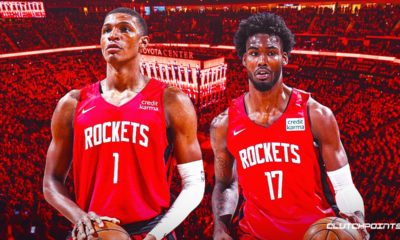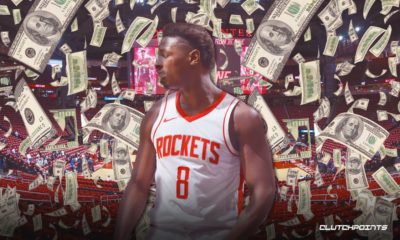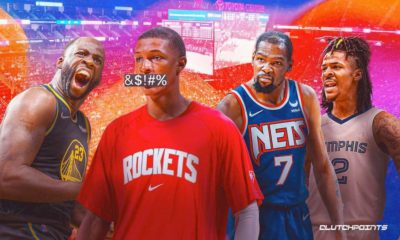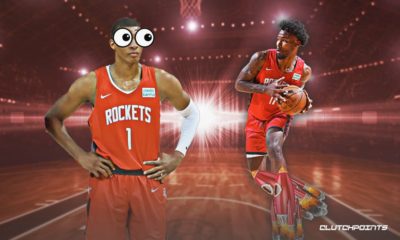Rockets
The Coaching Spin: Rockets-Jazz Series Preview
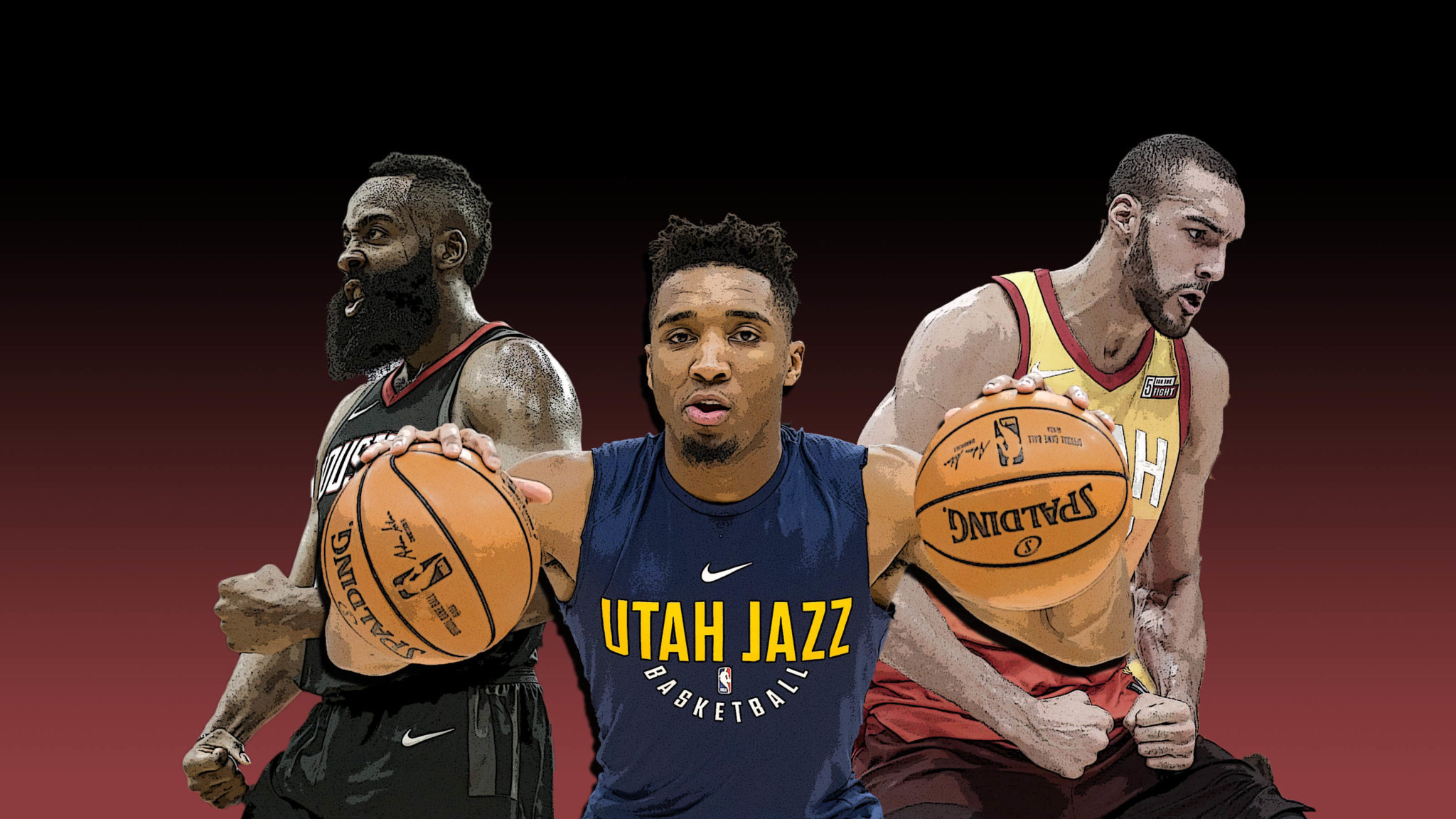

What’s that old adage? Something about the contrast between offense and defense?
“Offense wins games, defense wins championships.”
The Western Conference Semifinals series between the Houston Rockets and Utah Jazz will test that theory. Houston, boasting the league’s best record, highest-rated offense and second-most points per game in the regular season, are geared to face perhaps the premier defensive group in the league, anchored by dominant rim protector Rudy Gobert.
We finally get to see a contrast of styles, a huge contrast in pace and perhaps the two most impactful players on each side of the floor.
Houston’s eyes have been on Golden State since last June, when the Rockets traded for Chris Paul and begun to assemble a superteam of their own. Winning 65 games and securing home-court advantage throughout the playoffs was a wonderful step for the franchise, though for many it’s just another notch in the belt. Golden State is just one series away now, a showdown for the ages that many see as the de facto championship series. D’Antoni, MVP front runner James Harden and perennial playoff disappearing-act Chris Paul better not look too far ahead.
Frankly, the Jazz are a bit of a matchup nightmare for the Rockets. Utah’s entire defensive scheme is designed around forcing mid-range jumpers – the exact shots Mike D’Antoni encourages his team to avoid. The Jazz stingy defense slowly wear away at the star power of the Oklahoma City Thunder in the first-round, holding Russell Westbrook to 41 percent shooting from two-point range and forcing him into an average of ten mid-range attempts per game.
In an increasingly mathematically-driven league, the Jazz have the ideal scheme for taking opponents out of the shots they want to take. Everything starts and stops with Rudy Gobert. The Stifle Tower has a mammoth 7’9″ wingspan and quick reactions, allowing him to almost cover two players at once within a few feet of the rim. As such, Jazz coach Quin Snyder drops Gobert back on most pick-and-rolls, daring the offense to either take those low-value pull-ups or challenge his shot blocking prowess at the rim. Without a player as physically gifted as Gobert though, the style isn’t that effective.
The Jazz send their litany of long, smart and determined perimeter defenders over the top of nearly every ball screen, funneling the rock towards Gobert. In those moments the ball handler usually has a two-on-one, where he and the roller can briefly take advantage of one defender trailing the play after the screen. But because Gobert is so freakishly long those moments are few and far between:
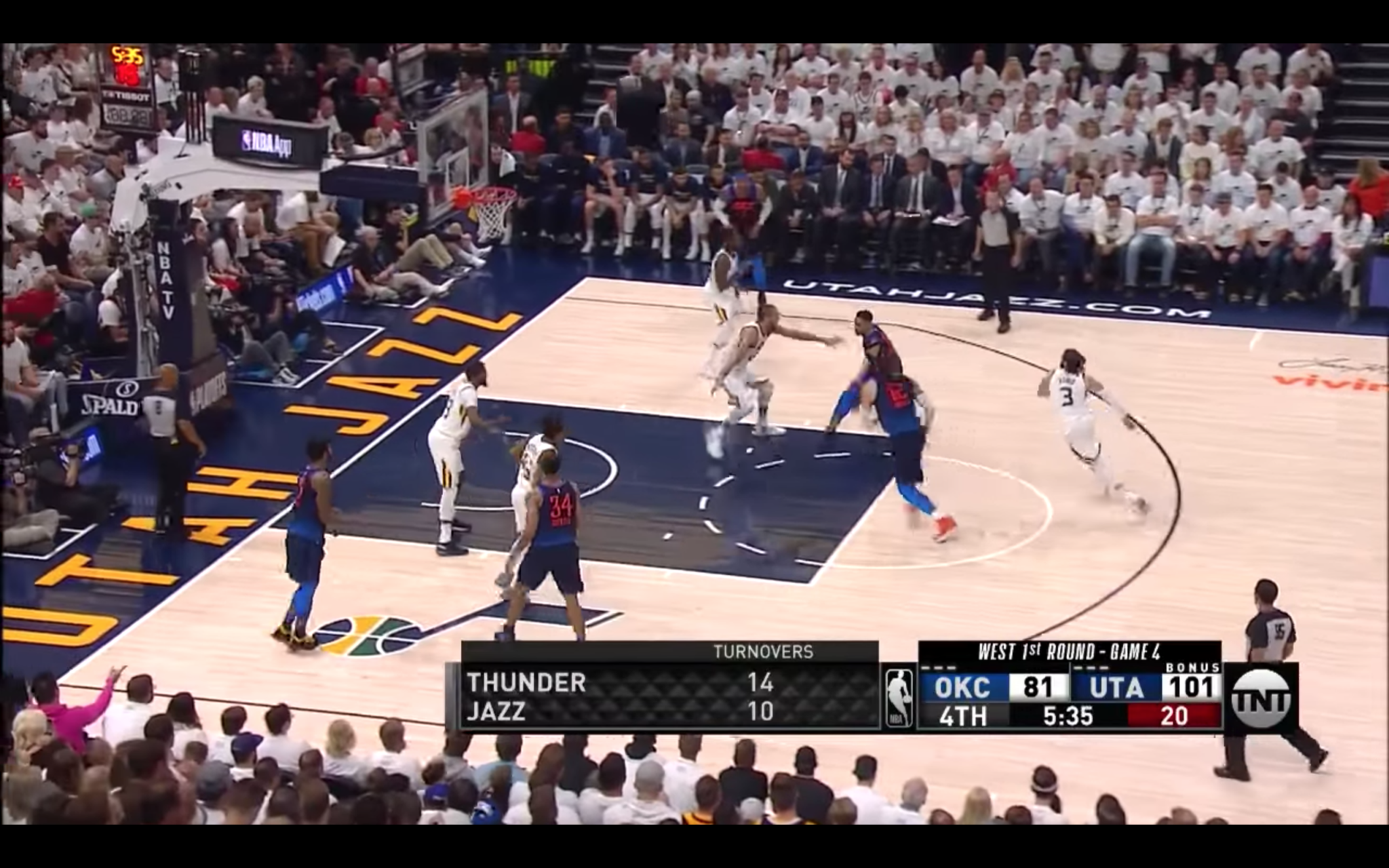
Gobert has mastered the angles he must take to get this down, staying close enough to the ball to contest a pull-up but distant as to not get blown by. He’s geometrically deployed to stay directly between the ball and the rim, but no less than one step from the roller, still syphoning off the rim from him as well.
Seeing the play at full speed, against a player with the raw power that Westbrook possesses, is all the more impressive:
James Harden certainly isn’t Westbrook, and Houston absolutely isn’t OKC. Harden is much more crafty (dare I say slippery) than his contemporary MVP rival. The Rockets surround him with much more shooting than Westbrook is afforded, and because Harden is such a lethal shooter in his own right, they set screens a step or two above the top of the key. That allows James a little extra room to play with and more ground for Gobert to cover on ball screens.
The Rockets are a heavy pick-and-roll team, meaning the fulcrum of Utah’s defensive gameplan will be for how to render their attack inert. The Rockets had success in forcing Gobert to switch onto Harden for some stretches, an area where James predictably torched his foe. While the Jazz are reticent to trap frequently with Gobert (especially with the slow-rotating Favors on the floor) they may have to work it in from time to time, just to keep Houston on their heels.
Utah has a ton of great individual defenders on their roster beyond Gobert. Ricky Rubio, on the heels of a fantastic first five playoff games where he averaged 16.8 points, 8.6 rebounds and 7.8 assists, left Game 6 against the Thunder with a hamstring injury and his status will be vital to Utah’s defensive success. He’s a pesky defender who can bother Chris Paul or chase Harden around the court. Without him, more will be asked of Joe Ingles, who is crafty in his own right but no match for the Harden isolations, and Donovan Mitchell. The last thing the Jazz want is to wear out their superstar rookie guarding physical picks possession after possession.
Off the bench, it’s likely Snyder tabs Dante Exum to slide into the rotation if Rubio is unable to go, utilizing Exum’s length. Doing so, and putting him on Paul, would neutralize some of the famed Chris Paul post-ups and prevent the Rockets from inverting Utah’s defense – putting a guard on the interior and dragging Gobert farther from the basket. Guys like Royce O’Neale and Jae Crowder provide switchability on actions, but Houston is the one team in the league where one-on-one isolations off a switch are about as scary as regular offense.
Actually, the two might be one in the same.
The X-Factor for Utah’s defense is where they end up putting Derrick Favors and how he ends up performing. Favors and Gobert have made their pairing work this season in ways few thought they could. Favors has found himself a tad more mobile than last year, allowing him to contest and chase some smaller 4-men around the court. What Houston does so well is provide adequate spacing at all times, with their 4 usually standing in one of the two corners while being a meaningful catch-and-shoot threat. Whether it is Trevor Ariza, Ryan Anderson or P.J. Tucker, Favors will have to be incredibly sharp with how he rotates to help.
D’Antoni may have tipped his hand in Houston’s last matchup with Utah back in late February, a 96-85 triumph for the Rockets. The final five minutes of the game saw a small-ball lineup from the Rockets with no centers on the floor: Paul, Harden, Ariza, Tucker and Joe Johnson shared the floor. Gobert had nowhere to hide down the stretch, checking Tucker for most possessions that ended in Houston trying to attack him through ball screens and a lot of pick-and-pops. To counter, Utah would switch Gobert onto another assignment as soon as they sniffed out the action, keeping him closer to the rim and off Tucker as soon as he’d go to screen:
The Rockets had more success when they could pick-and-pop this surgical takedown of Gobert, spreading the floor more their increased shooting ability. Harden would chill with the ball a good five feet beyond the three-point line, and whoever Gobert was guarding would just sprint into the screen. Without any players surrounding the paint, there was nowhere for the frenchman to switch to. Harden then gets a head of steam, attacks downhill and can make an easy throwback for a rhythm three-pointer:
Houston was without Clint Capela in this contest, so it’s hard to know if D’Antoni did this out of desire or necessity. If Rudy is having a tremendous impact defensively, don’t be shocked to see Houston go super small, try to isolate him and run him around, and get him away from the rim with pick-and-pops. The Jazz will then have to essentially pick which player they want taking wide open three-pointers and hope that doesn’t sink them. One thing that is certain: Utah cannot employ their twin towers frontcourt against this much speed and live to tell the tale – Houston has too many good shooters for the Jazz to play this game of Russian Roulette with.
On the other end, the Rockets are likely without their best individual defender for at least the first few games of the series. Luc Richard Mbah a Moute is banged up, and he might be the most impactful player dollar for dollar on either team. That’s so important because of how it morphs Houston’s defensive rotations around on Donovan Mitchell. Houston last started their game with Trevor Ariza on the rookie, letting Paul guard Rubio, as well as trapping ball screens near the sidelines. As soon as Mbah a Moute checked in though the Rockets abandoned all blitzes of screens and let him play one-on-one with Mitchell.
Without him here, we could see a few more traps thrown in, but by and large it means Houston will throw the gamut at him. From Ariza to Tucker, CP3 to Eric Gordon, multiple bodies will get their shot at Mitchell. That said, Harden and perhaps one other non-defender will be on the court for Houston, daring the Jazz to abandon their preferred style of play and pick apart mismatches with Mitchell.
Houston has increased their reliance on switches late in the season, especially when Harden is involved in screens. Switching off-ball screens are obvious with their benefits: it keeps a lazy on-ball defender away from the rock and saves his energy instead of chasing one man around the court. Against a team with as much player movement within their offense as Utah, Harden should be thankful for this tactic. On-ball screens that are switch essentially beg teams to try and post Harden with a big, and the strong-chested guard does a great job battling there and forcing bigs to even get knocked off their spot.
Gobert may be too large and dominate Harden on the glass and for lobs over the top. Rubio, Ingles and Mitchell are great passers over the top of the defense and can find Gobert for undefendable passes down low. The rest of the defense will be keyed in on Mitchell in particular, leaving Harden little backside help. But in that aforementioned small-ball lineup the Rockets went to against Utah, Harden was the primary defender on Gobert. Rudy was able to get one post-up in those minutes, and it came against Chris Paul in a semi-transition miscommunication when the game had already been decided. Perhaps Harden on Gobert is the secret sauce late in games for Houston.
Utah’s offense is good when they’re super big (Gobert and Favors together) or a bit smaller (with only one as the center and either Crowder or Jerebko at the 4). That small group can match with the Rockets quite nicely, especially when Ryan Anderson is on the pine. But Anderson may provide the best spot for Favors to thrive, meaning the Jazz run much more ball screen coverage with Favors as the screener, Gobert roving on the baseline and shooters swirling around the three-point arc.
The smaller groups feature more true motion sets and spread pick-and-rolls after a false front of movement. Snyder has garnered a reputation for the team’s slow, methodical and pass-heavy offense over the last few years. Their pace statistics (25th in the NBA in 2017-18) and shot attempts (29th) only reinforce that narrative. But in the first-round against Oklahoma City, Snyder seemed much more content to keep the ball in Mitchell’s hands for an entire possession. One small screen or fake screen would take place, just to move the help defense a little, before they went to their bread-and-butter: a Mitchell-Gobert pick-and-roll.
Rewind the film from Game Six and that was pretty much every crunch time possession for Utah. He straight up took over in the second-half and single-handedly brought the Jazz the lead which distanced them from Oklahoma City once and for all. He’s got a great burst that allows him to get past his man one-on-one, but screens free up a little more room for him. It’s when he gets into the lane that Mitchell shows his true magic. His spin move might be the most effective one in the league, and the crafty up-and-under layups he masters game after game are a refreshing throwback. If he gets a step and a paint touch, he’s basically an automatic bucket, averaging nearly 30 per game in the first-round series.
It will be interesting to see what the Rockets prefer: switching all his actions and settling for isolations, or preserving their worst defenders and letting Mitchell get a little deeper penetration. In a long series pretty much all tricks are emptied from the sleeves, but the tactics called upon in crunch time are the ones that count the most. Their waning defensive personnel make this the X-Factor for them in the series: can they get enough out of their guys to prevent Mitchell from taking over for stretches?
We probably don’t give the Rockets enough credit for their strong defense this year, especially for the little things they sew up. Houston rarely fouls but blocks a good deal of shots, they do a great job defending the three-point line (and chasing them off with their speed) and allowed the third-fewest offensive rebounds in the league through the regular season. A small team that does as well on the glass as they do speaks to the types of players they have on the wings: gritty, long and rebound-hungry players like Tucker and Ariza.
The absence of Mbah a Moute would hurt here, but Utah will also miss Rubio on this end should he miss time. Getting Mitchell easy buckets, or having a maestro that can adeptly play 4-on-4 in the middle of the floor is a source of great offense for the Jazz once Donovan gets going. It also gives the Rockets one fewer perimeter player to hide one. Imagine that: a few months ago we were ready to bury Rubio as a liability, and now his absence could be crucial for Utah.
The Rockets swept Utah during the regular season, although two of them came pre-trade for the Jazz and one other without Gobert. That fourth and final matchup, coming in February, was much more indicative of what I imagine this series will be like. It’s a constant push-pull between two differing styles of play and tempos of attack. One wants to push, take a ton of threes and fire up the first good shot available. The other is slow and methodical, avoiding transition in favor of a pin-pointed attack in the half-court.
Two statements are obviously true: the team that makes more shots and controls the tempo in their favor will likely win. But this is no walk in the park for Houston, and may end up being the most highly contested second-round series of the postseason. Harden is every bit an MVP this year, and Mitchell a rising star in his own right. Rudy Gobert is as dominant as any player is on one side of the floor though, and his brilliance – and how the Rockets try to attack it – could determine if Houston gets caught in a dogfight before their date with the Warriors.
Prediction: Houston in 7
Unless otherwise noted, all stats are courtesy of NBA.com, Synergy Sports Tech or basketball-reference and are current as of April 28, 2018.
The post The Coaching Spin: Rockets-Jazz Series Preview appeared first on ClutchPoints.






